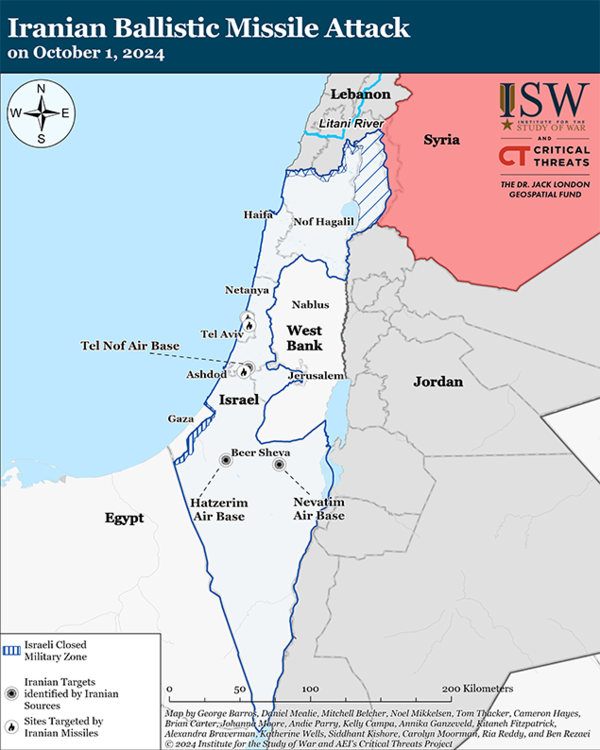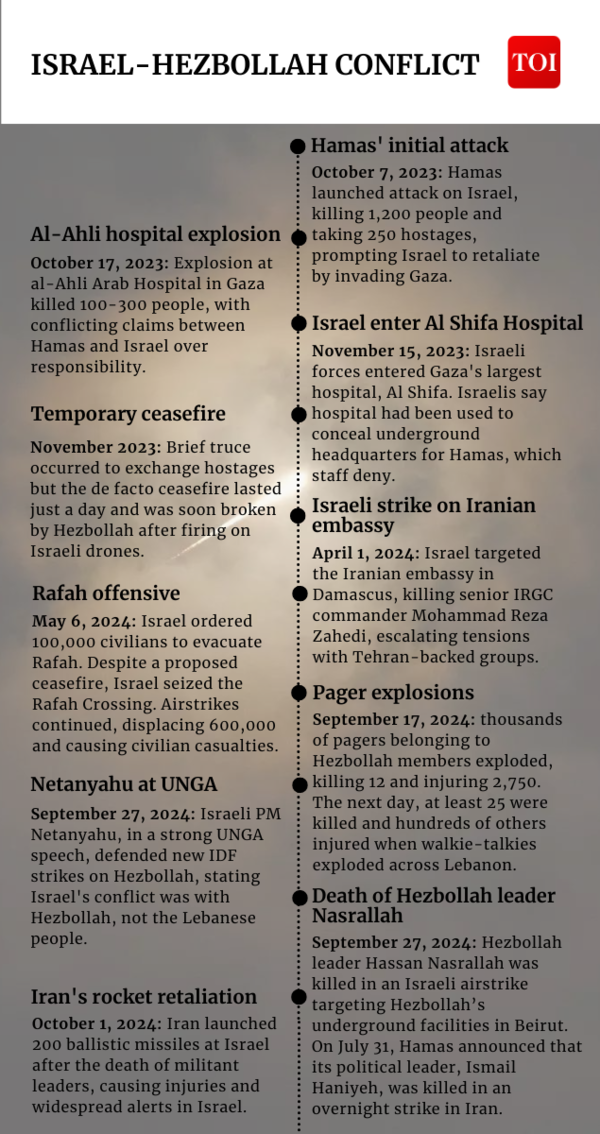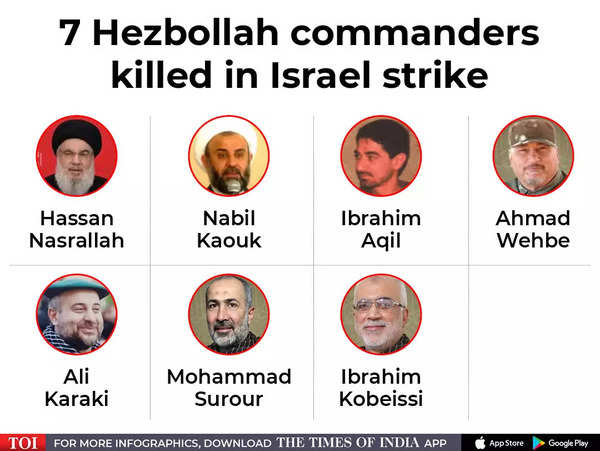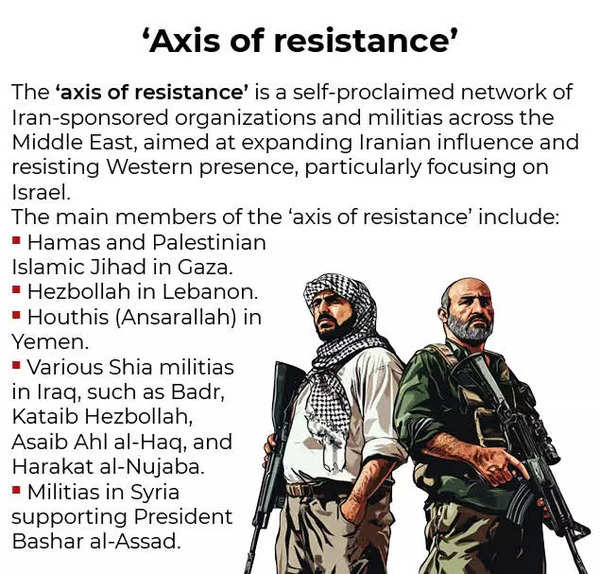Iran on Wednesday introduced that its missile strike on Israel, essentially the most vital navy motion towards the Jewish state, had concluded, except additional provocation occurred. In the meantime, Israel vowed to take retaliatory measures towards Tehran, heightening issues a few potential broader battle.
Driving the information
- In an announcement, Iranian protection minister Brigadier Common Aziz Nasir Zadeh asserted that Iran launched assaults on Israeli “navy, operational and intelligence” facilities believed to be linked to the assassination of
Hamas chief Ismail Haniyeh. - As per a ISW report quoting Iranian media, following airbases have been focused in Israel:
- The Nevatim Airbase, located close to Beersheba, Israel, is residence to Israeli F-35s.
- The Hatzerim Airbase, positioned within the Negev Desert, was additionally focused.
- Moreover, the Tel Nof Airbase, located 20 kilometers south of Tel Aviv, was among the many targets.
- Israel is deliberating its response to Iran’s current missile barrage. With the stakes greater than ever, Israeli Prime Minister
Benjamin Netanyahu has vowed that Tehran will face extreme penalties, saying that Iran had “made a giant mistake” and can “pay for it.” - The US, in the meantime, is pushing for a measured Israeli response to keep away from a broader regional warfare, however its affect could also be restricted in shaping Israel’s subsequent steps.
- This newest spherical of hostilities threatens to increase far past the Israel-Palestine battle, pulling in regional powers like Iran, and sparking fears of a full-scale warfare throughout the Center East.
- Iran’s transfer is seen as a calculated threat geared toward each displaying solidarity with its allies
Hezbollah and Hamas, whereas additionally testing the resolve of Israel and its US ally.

Why it issues
- The involvement of Iran in a direct missile assault on Israel dramatically raises the stakes. Israel has lengthy been engaged in a shadow battle with Iran, marked by cyberattacks, covert operations, and proxy battles. Now, the shadow warfare dangers turning into an open confrontation.
- This escalation additionally comes at a time when the US is busy with probably the most polarised, intently contested presidential elections in its historical past.
- In the meantime, the US can also be making an attempt to navigate a number of geopolitical crises. As Washington grapples with its response to Russia’s warfare in Ukraine and the rising assertiveness of China, it now faces the prospect of being deeply drawn into one other Center Japanese battle.
- The Biden administration is making an attempt to keep away from a brand new warfare within the area, urging Israel to keep away from a large retaliation that would set off a spiral of violence. But, the US has pledged unwavering assist for Israel’s safety, and the way it balances these two positions can be vital in shaping the subsequent part of this battle.
The large image
- Whereas Iran’s missile barrage didn’t inflict vital injury, it has nonetheless altered the trajectory of the battle. Iran, emboldened by its strategic alliances with Hezbollah, Hamas, and different regional militias, is looking for to place itself as a key participant within the resistance towards Israel. Tehran’s management has framed its missile strike as a justified retaliation for Israel’s current assassination of senior Hezbollah figures, together with its chief Hassan Nasrallah. Iranian officers have threatened additional assaults if Israel retaliates, warning that such actions would invite “crushing assaults” on Israeli infrastructure.
- The US has responded to the scenario by reaffirming its dedication to Israel’s safety. Whereas the Biden administration has been actively concerned in supporting Israel’s protection efforts—most notably by means of joint missile protection programs—it is usually eager to stop a regional warfare. Washington has been working behind the scenes to reasonable Israel’s response, emphasizing that Iran’s missile strike, whereas a major escalation, didn’t obtain its meant goals.
- But, none of those efforts are prone to dissuade Israel from putting again. Netanyahu’s robust rhetoric signifies {that a} strong navy response is all however sure. The query now’s how far Israel will go in its retaliation. Up to now, Israel has responded to Iranian provocations with focused strikes towards particular navy installations, avoiding a broader escalation. Nonetheless, the size of Iran’s missile assault could push Israel to take extra aggressive actions this time, together with strikes on Iran’s nuclear amenities or key infrastructure.

Learn extra:Did Netanyahu really flee to bunker? Viral video sparks controversy after Iranian missile strike
Can Israel kill its option to a regime change in Iran?
In a video message on Monday, Israeli PM Netanyahu declared {that a} change in Iran’s authorities was imminent.He asserted that the time when “Iran is lastly free” would arrive a lot sooner than anticipated.
Netanyahu criticized the “fanatic theocrats” who at the moment govern Iran. He expressed his perception that after the Iranian regime is overthrown, the connection between the 2 nations will endure a major transformation.
“Our two historic peoples, the Jewish folks and the Persian folks, will lastly be at peace. Our two nations, Israel and Iran, can be at peace,” Netanyahu stated, emphasizing the potential for a brand new period of concord between the 2 nations, as soon as the present Iranian management is now not in energy.
However can Israel deliver a few regime change in Iran? Israel’s navy strategy of concentrating on key figures and infrastructure has had some success in its ongoing warfare with Hamas and Hezbollah. Hezbollah’s capabilities, notably in southern Lebanon, have been considerably diminished. With Hezbollah on the backfoot, Israel may really feel emboldened to strike deeper into Iran’s infrastructure and even its management, aiming to disrupt its political core.
Learn extra: Netanyahu vows to make Iran pay after missile attacks on Israel; US warns of severe consequences: Key developments

Nonetheless, Israel’s previous experiences with Hamas and Hezbollah recommend that whereas management decapitation can cripple militant organizations, it hardly ever brings concerning the collapse of the broader buildings that maintain them.
Whereas Israel’s intelligence and technological capabilities are superior, Iran has the sources and institutional depth to face up to management losses.
Furthermore, the dangers of a full-scale warfare with Iran stay a major deterrent, particularly with out assured US navy assist. Norman Roule, former US intelligence officer on Iran, advised the Wall Avenue Journal: “Israel will search to strengthen the concept its technological superiority and navy talent enable it to strike any goal in Iran.” However “a warfare with Iran would require the political, financial, and navy assist, if not participation by the USA,” Roule added.
A serious Israeli assault on Iran’s nuclear amenities or financial infrastructure may provoke a bigger battle, and probably speed up Iran’s nuclear ambitions. “Such an airstrike may provoke Tehran to launch a bigger missile barrage, orchestrate terrorist assaults towards Israeli pursuits overseas, and step up its nuclear program, hastening Iran’s path to a bomb,” warned Roule.
Learn extra:Iran-Israel conflict sparks oil price concern: How will it impact India?
In the end, whereas Israel could efficiently weaken Hezbollah and goal Iranian management figures, the broader query of whether or not navy pressure alone can result in regime change in Iran is uncertain. Historical past has proven that whereas decapitation strikes could weaken adversarial forces, they hardly ever result in political upheaval. Iran’s deep institutional power and the assist it enjoys from regional proxies, popularly referred to as ‘axis of resistance’ make it unlikely that airstrikes alone may dismantle the regime.

What they’re saying
- US nationwide safety adviser Jake Sullivan acknowledged the gravity of Iran’s missile barrage, calling it a “vital escalation.” Nonetheless, he emphasised that it was “in the end defeated and ineffective,” due to the mixed efforts of Israel and US missile protection programs. Regardless of the assault’s failure to trigger vital injury or casualties, the symbolism of Iran’s motion can’t be overstated. It represents a daring transfer by Tehran to claim itself within the ongoing battle and ship a message that it’s going to not stand idly by as its allies in Hezbollah and Hamas come underneath assault.
- Jonathan Panikoff, a former US intelligence officer now on the Atlantic Council, warned that the area is at a tipping level. “The problem of avoiding a regional warfare is at its most tough level since October 7,” Panikoff advised the WSJ. Panikoff additionally highlighted the constraints of US diplomatic leverage, notably in gentle of the administration’s battle to dealer a ceasefire between Israel and its adversaries in Gaza and Lebanon. “The US already lacks adequate diplomatic leverage to compel a ceasefire in Gaza and Lebanon,” Panikoff added, underlining the problem of de-escalating the present scenario.
What’s subsequent
- Israel’s response to Iran’s missile barrage can be vital in figuring out the long run course of the battle.
- The Biden administration has pledged to make sure that Iran faces “extreme penalties” for its actions, though the specifics of these penalties stay unclear. Some analysts recommend that stepped-up sanctions enforcement or navy assist to Israel could possibly be a part of the US response. Nonetheless, any US involvement dangers deepening the battle, notably if Iran retaliates towards US forces or pursuits within the area.
- Israel’s problem can be to strike a stability between deterring additional Iranian aggression and avoiding actions that would escalate the battle past its management.
(With inputs from businesses)
‘Will Assault Iran’: Netanyahu’s huge declaration in first response to missile strike



